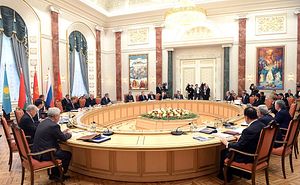Four months after the post-Soviet space entered the new “epoch” of the Eurasian Economic Union (EEU), it’s clear that the EEU stands as a mix largely of disappointment and distaste. The issues hammering the EEU in the run-up to its January inception – Moscow’s self-sanctions policy, the neo-imperialist underpinnings, Moscow’s sprint toward recession – remain as apparent as they did prior.
Armenia has returned to making overtures to the European Union. Tajikistan appears nowhere closer to joining than it did last year, regardless of what Russian propaganda outlets say. And according to at least one Russian outlet, Russia and Kazakhstan – the two primary actors within the EEU – are currently embroiled in a “trade war.” While the phrase may be a bit hyperbolic, and while officials have denied a war exists, it’s clear that economic integration between the two neighbors has not only halted, but reversed, and tit-for-tat economic sniping has replaced whatever assimilation existed prior. Given the current state of economic affairs within the grouping, there’s little likelihood these trends – this fraying – will end any time soon.
This slow unraveling may be one of the primary factors in Kyrgyzstan’s announcement that it may well delay its accession to the EEU. Bishkek looked set to join the group on May 9 – in time for Moscow’s Victory Day parade, conveniently – no matter the issues of customs checks, migrant labor transit, or hit Kyrgyzstan would see to its re-export trade from China. But then, as final preparations got underway, Economic Minister Temir Sariev – Kyrgyzstan’s likely future prime minister, no less – announced this week that accession may be delayed until the end of May, if not longer. At issue remains the opening of borders. Considering the isolationist turn Kazakhstan’s recently taken within intra-EEU trade, this comes as little surprise.
Sariev isn’t totally out of line with Kyrgyzstan’s former prime minister, who recently relayed that Kyrgyzstan was joining the EEU because “there is no alternative.” Still, the delay still seems yet another mark against the EEU, and a reminder of the lack of enthusiasm on either end in Bishkek’s accession. Four months in, the Eurasian Union still exists, but any kind of new epoch is nowhere to be found.
































